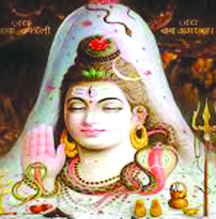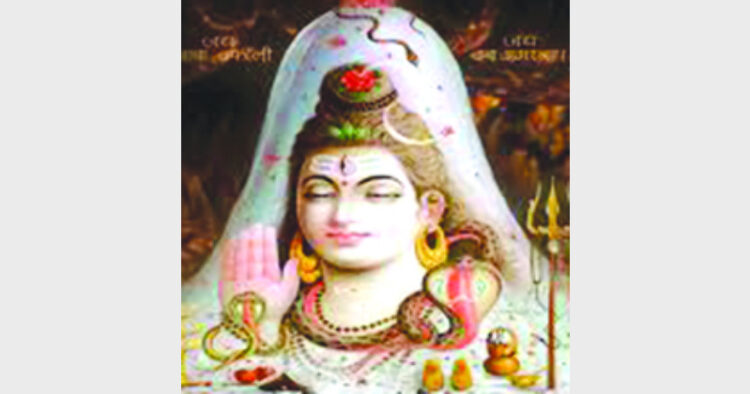VN Gopalakrishnan
 Maha Shivaratri (‘the Night of Shiva’) festival is celebrated with devotion and religious fervor in honour of Lord Shiva, one of the deities of Hindu Trinity. The festival falls on the 13th or the 14th night of the new moon during Krishna Paksha in the Hindu month of Phalguna. The Sanskrit term, Krishna Paksha means the period of waning moon and Phalguna corresponds to the month of February-March in english calendar. This year Shivaratri is celebrated on the moonless night on February 27.
Maha Shivaratri (‘the Night of Shiva’) festival is celebrated with devotion and religious fervor in honour of Lord Shiva, one of the deities of Hindu Trinity. The festival falls on the 13th or the 14th night of the new moon during Krishna Paksha in the Hindu month of Phalguna. The Sanskrit term, Krishna Paksha means the period of waning moon and Phalguna corresponds to the month of February-March in english calendar. This year Shivaratri is celebrated on the moonless night on February 27.
Lord Shiva is being worshipped as the paramount lord by the Shaivites. Shiva (‘auspicious one’) is one of the most complex gods, embodying seemingly contradictory qualities. He is the destroyer and the restorer, the great ascetic and the symbol of sensuality. Shiva’s female consort is known under various manifestations as Uma, Sati, Parvati, Durga and Kali. The divine couple, together with their sons, Skanda and Ganesha are said to dwell on Mount Kailash in the Himalayas. Lord Shiva is usually depicted as ash-coloured, with a blue neck, his hair arranged in a coil of matted locks and adorned with the crescent moon and the Ganges. He has three eyes bestowing inward vision and capable of burning destruction when focused outward. He wears a garland of skulls and a serpent around his neck and carries in his hands a deer skin, a trident, a small hand drum or a club with a skull at the end. He is represented in a pacific mood as the cosmic dancer, as a naked ascetic, as a mendicant beggar and as a yogi. Lord Shiva has more than a thousand names, which are detailed at length in the 69 th chapter of Shiv Purana. Among his common epithets are Sambhu, Sankara, Pasupati, Mahesa and Mahadeva.
Maha Shivaratri is considered to be auspicious especially for women. The married women and unmarried girls perform puja with great faith since Parvati is considered as the giver of married bliss. While unmarried girls pray to give them handsome husbands with wealth and knowledge, married women pray for the well-being of their husbands. According to Hindu mythology, Shivaratri symbolises the wedding day of Lord Shiva and Parvati. However, many believe that Lord Shiva performed the Tandava Nritya, the dance of primordial creation, preservation and destruction on Shivaratri. According to Linga Purana, Lord Shiva manifested himself in the form of a Linga on Shivaratri.
Celebrations of Shivaratri festival mainly takes place at the temples during night. Devotees of Lord Shiva throng Shiva temples across the country and spend Shivaratri by chanting hymns in praise of the Lord. They observe strict fast in honor of Lord Shiva, though many go on a diet of fruits and milk. Devotees believe that worship of Lord Shiva on Shivaratri, absolve them of their sins and liberates from the cycle of birth and death.
Shiva Purana has prescribed the rituals to be followed during Shivaratri. Accordingly, every three hours, Shivalinga is given a special bath with milk, yoghurt, honey, sandalwood paste and rose water. Vermilion paste is applied on the Shivalinga followed by Puja, meditation and chanting of Om Namah Shivaya Mantra. Devotees break their fast only on the following morning by partaking the prasad offered to the deity.
According to Shiva Purana, there is a special significance to the puja items. Bathing of Shivalinga with water, milk and honey represents purification of the soul; vermilion paste applied on the linga represents virtue; offering of fruits symbolises gratification of desires; burning of incense sticks yields wealth; lighting of lamp symbolises attainment of knowledge and offering of betel leaves marks satisfaction with worldly pleasures.
Traditionally, leaves of Bilwa (aegle marmelos) are used for Shiva puja believing that Goddess Lakshmi resides in them. There is a story associated with this. A tiger was chasing a man and he out of fear ran and finally climbed on a tree. The tiger also sat just under the tree. The man started plucking the leaves and dropped them one by one to keep him awake whole night. Next day morning, Lord Shiva appeared before the man and blessed him. The man is said to have attained salvation.
It is said that after the creation of the universe was complete, Parvati asked Lord Shiva as to which rituals pleased him the most. The Lord replied that the 13th night of the new moon, during the month of Magha, is his most favourite day. In the Shanti Parva of Mahabharata, Bhishma, while resting on the bed of arrows and discoursing on Dharma (righteousness), refers to the observance of Maha Shivaratri by King Chitrabhanu. The story is also told in the Garuda Purana. For many people, Lord Shiva is Paramatman, the Absolute Brahman, but others prefer to see Lord Shiva as a personal God.
(Author is a Mumbai-based freelace journalist and social activist. He can be contacted on [email protected] )













Comments